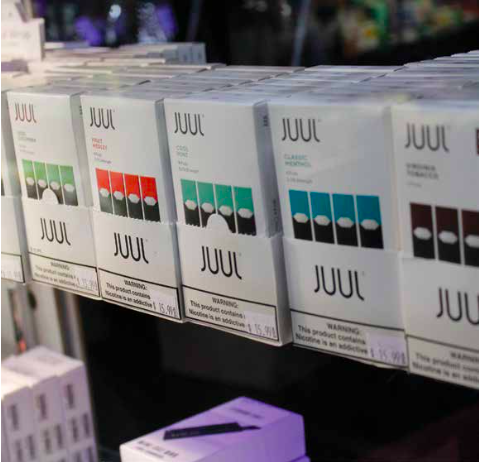
The rising trend of Juul brand vaporizer pods, especially among minors, may dissipate with the fruit flavors no longer being sold in stores.
The announcement from Juul Labs that they would no longer sell most flavors of pods in retail stores, as well as discontinue social media promotions, was made after receiving pressure from the Food and Drug Administration over teenage vaping, according to the New York Times.
Government data from 2017 shows that over three million middle and high school students reported using e-cigarettes and one-third said the flavors were a big factor in their choice
Many students believe underage nicotine addiction is an issue and Ferris dental hygiene freshman Lauren Barkell said the decision to stop selling the pods may be too late. “Obviously it’s bad because they’re all getting nicotine addictions at super young ages and they don’t realize how bad it is for you because they just think it’s cool,” Barkell said. “I think it’s a little too late because even if the Juul brand stops doing that, they’re still going to go to other vape shops to get other juices for other Suorins or whatever.”
Ferris welding junior Kolin Groom also said he does not believe the move will have much of an impact on existing users.
“For new users of the product I think it’ll help, but for those who are already using a Juul or already know about the thing, I don’t think it’ll make a difference,” Groom said.
Juul Labs retains more than 70 percent of the e-cigarette market share in the U.S. and said they would keep mint, tobacco and menthol avors in stores to prevent users from reverting to menthol cigarettes, according to the New York Times.
Groom said he believes that while the flavors may have played a part in youth interest, it may not be the whole reason for its appeal.
“I think that is actually a very good point, but I think the other point is the social media portrays Juul as a popularity type of thing and all the cool people have a Juul,” Groom said. “So, it’s not just necessarily mint or mango or whatever flavors they have, it’s how they portray it in the media.”
Other aspects of the Juul, such as its size, may have attracted minors to it, according to Ferris welding junior Brian Hitts.
“I think the size plays a huge factor. They’re able to hide it, and it’s easy and compact, so I feel like that’s what made it more convenient for them to have it, just the sheer size of it,” Hitts said.
The online verication process for buying Juul products will also be tighter to ensure customers are 21 or older and eventually they will have a real-time photo requirement to match a buyers face to their government-issued ID. Some companies have even voiced support for raising the age to 21 for purchasing all tobacco and vaping products, according to the New York Times.
“I think it’s a good idea to try and control some of it, but either way, people are going to get it. They still find loopholes or people buy for them, so it’s just what age group are you going to try to restrict buying,” Hitts said. “Who are you going to make responsible for buying the product? So if you push it to 21-year-olds, now it’s who’s helping who out and how are they getting it if they aren’t 21, and where do you go from there.”
Juul said it will be shutting down its Facebook and Instagram accounts in the U.S. that promoted usingavored pods and according to its release, it would ask major social media outlets, such as Twitter and Snapchat, to assist them in policing posts that promote underage use of e-cigarettes.
According to the New York Times, several officials met with e-cigarette and tobacco companies to discuss ways to discourage youth vaping and threatened to take e-cigarettes off the market if teenage sales were not curbed.
